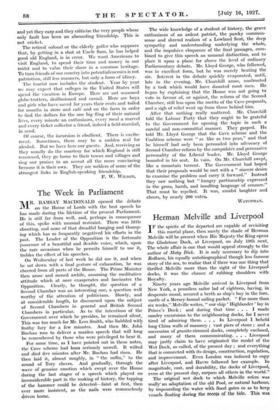The Week in Parliament M R. RAMSAY MACDONALD opened the debate
on the House of Lords with the best speech he has made during the lifetime of the present Parliament. He is still far from well, and, perhaps in consequence of this, spoke with unusual restraint. There was little shouting, and none of that dreadful banging and thump- ing which has so frequently negatived his efforts in the past. The Leader of the Opposition is the fortunate possessor of a beautiful and flexible voice, which, upon the rare occasions when he permits himself to use it, trebles the effect of his speeches. On Wednesday of last week he did use it, and when he sat down with a final gesture of exhaustion, he was cheered from all parts of the House. The Prime Minister then arose and mused awhile, assuming the meditative attitude which at once exasperates and fascinates the Opposition. Clearly, he thought, the question of a Second Chamber was an interesting one, a question well worthy of the attention of politicians. Slowly, and at considerable length, he discoursed upon the subject of Second Chambers in general and British Second Chambers in particular. As to the intentions of the Government over which he presides, he remained silent. This was too much for Mr. Lees Smith, who Bubbled with frothy fury for a few minutes. And then Mr. John- Buchan rose to deliver a maiden speech that will long be remembered by those who were privileged to hear it. For some time, as I have pointed out in these notes, the Cave scheme had been seriously unwell. It wilted and died five minutes after Mr. Buchan had risen. He then laid it, almost roughly, in " the coffin," to the sound of Tory cheers. And gradually, through the wave of genuine emotion which swept over the House during the last stages of a speech which played no inconsiderable part in the making of history, the tapping of the hammer could be detected—faint at first, then ever more insistent, as the nails were remorselessly driven home. The wide knowledge of a student of history, the grave enthusiasm of an ardent patriot, the pawky common- sense and shrewd realism of a Lowland Scot, the deep sympathy and understanding underlying the whole, and the impulsive eloquence of the final passages, com- bined to give this speech an unusual distinction, and to place it upon a plane far above the level of ordinary Parliamentary debate. Mr. Lloyd George, who followed, was in excellent form, but he was merely beating the air. Interest in the debate quickly evaporated, until, late in the evening, Mr. Churchill arose, confronted by a task which would have daunted most men. He began by explaining that the House was not going to vote in favour of, or against, the reform of the Second Chamber, still less upon the merits of the Cave proposals, and a sigh of relief went up from those behind him. After that nothing really mattered. Mr. Churchill told the Labour Party that they ought to be grateful to the Government for opening the topic in such a careful and non-committal manner. They gasped. He told Mr. Lloyd George that the Cave scheme and the Coalition scheme were " as like as two peas," and that he himself had only been persuaded into advocacy of Second Chamber reform by the compulsWe and persuasive personality of the Liberal leader. Mr. Lloyd George bounded in his seat. In vain. On Mr. Churchill swept, like a mountain torrent. The Government had hoped that their proposals would be met with a " sincere desire to examine the problem and carry it forward." Instead they saw nothing but " hungry partisanship expressed in the gross, harsh, and insulting language of censure." That must be repelled. It was, amidst laughter and cheers, by nearly 200 votes.
WATCHMAN.










































 Previous page
Previous page